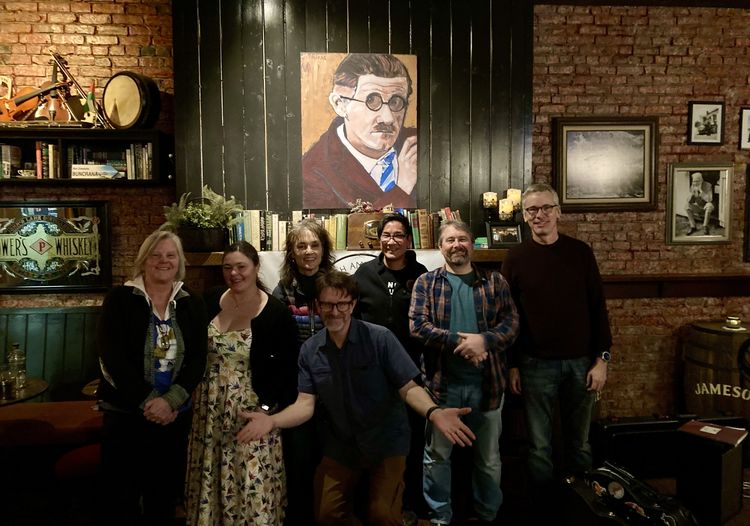Doireann Glackin, left, and Sarah Flynn.
Traditional Music / By Daniel Neely
I love albums that combine high level playing with eye catching research. Examples that spring immediately to mind include Mick Moloney’s “If It Wasn’t For The Irish and the Jews,” Seán McElwain’s “Our Dear Dark Mountain With The Sky Over It,” Niamh Ní Charra’s “A Tribute To Terry "Cuz" Teahan,” Elaine Hogan and Sheila Garry’s “The Shores of Lough Breda,” Mick O'Brien, Emer Mayock and Aoife Ní Bhriain’s “Tunes from the Goodman Manuscripts,” and others. There are several others, but the combination of taught research and high level playing is one that I think adds great value.
“The Housekeepers,” the recently released from Doireann Glackin and Sarah Flynn, is exactly this sort of album. Exploring the music and lives of Ella Mae O’Dwyer, Nora Hurley, Aggie Whyte, Ellen Galvin, and Mollie Myers Murphy, five women active in the early 20th century, it lets two young musicians shine while at the same time making a concise statement about a handful of influential women many might not know about. It’s brilliant stuff.
https://youtu.be/o6pJ0sxq9yw
Glackin comes from a highly respected musical background: the Glackins, as many readers will know, are a very well-known musical family in Dublin, and her grandfather is the legendary Seán Ó Riada. She is a widely known fiddle player and sean-nós singer in her own right who, in addition to being a presenter for TG4 (she’s worked on shows including FleadhTV, the Gradam Ceoil awards show, and TradfestTG4), is at work on a PhD that explores sean-nós singing in Co. Cork.
Flynn, also from Dublin, plays concertina. She’s a longtime participant in that city’s session scene and a familiar face at the Cobblestone, the Pipers Corner, and elsewhere. Although she finds inspiration from a lot of musicians, her early, direct influences include Caoimhe Peat, Aoife O’Connor, Mairead Hurley and Noel Hill. Her family is musical as well, with her brother John Flynn, a member of the band Skipper’s Alley, appearing on this album, playing guitar.
The two musicians have clearly done their homework to shine the kind of wonderful light they have on O’Dwyer, Hurley, Whyte, Galvin, and Murphy’s lives. Their work seems to be multi-leveled in terms of methodology. In the liner notes each woman is given a short biography, all of which are fascinating and seem to integrate interviews material and oral history with the rigors of archival work. I won’t outline each woman’s biography here, but they’re all available for free on the duo’s website (see link at bottom) and I highly recommend visiting to read them directly. They’re informative and presented in a brilliantly accessible manner.
The music on the CD is superb. Glackin and Flynn are both excellent players who have a strong rapport, as they play with a unity and sense of purpose to which lovers of traditional music will, I think, be drawn. There’s a cool lift in the music here that permeates every track. In their selection they’ve taken several tunes and idiosyncratic versions of tunes associated with the women they’ve focused on and given them new life. They also include several other tunes, some of them quite unusual, to round out the set. There are a few chestnuts to be found here. “Nora’s Fancy” is a lovely one, as is “Sonny’s Delight” (composed by Nora Hurley). The three tunes in the “Housekeepers /…” jig set are also excellent, as is Mollie Myers’s version (via Tom Billy Murphy) of “The Butcher’s March.”
The album also includes a couple of well chosen tunes associated with other women, including Elizabeth Crotty and Julia Clifford. Keep in mind the duo acknowledge a number of influential women in the liner notes, including Kathleen Harrington, Kitty Hayes, Eleanor Kane, Lucy Farr, and Mrs. Dalton, but they rightly explain that their stories fell outside the limited scope of this particular project. (This being said, they do leave the door open to future work in this direction.)
For those interested, I’d say “If There Weren’t Any Women In The World,” OldTime Records’ reissue of tracks that feature women recorded 1916-1945, is an intriguing complement to this album. The same might be said of “The Music of Julia Clifford” (www.juliaclifford.eu), a website that went up earlier this year exploring Clifford’s music and life. Both are research oriented and highlight not only the regular contributions of women to traditional music, but reveal how much more work there is to do to better tell their story.
“The Housekeepers” is an outstanding album that people should take the time to hear. Glackin and Flynn have taken the musical bond they share and used it to say something great about an aspect of traditional music they felt needed addressing. Their research is informative and well balanced, and their playing matches suit perfectly. One for the collection! For more information about “The Housekeepers,” visit www.flynn-and-glackin.ie.








